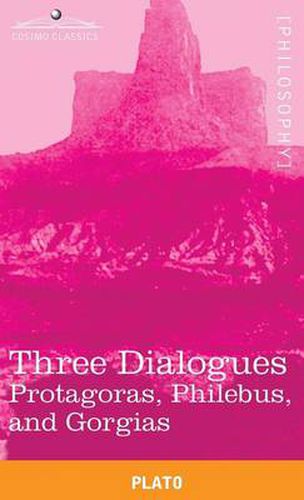Readings Newsletter
Become a Readings Member to make your shopping experience even easier.
Sign in or sign up for free!
You’re not far away from qualifying for FREE standard shipping within Australia
You’ve qualified for FREE standard shipping within Australia
The cart is loading…






This title is printed to order. This book may have been self-published. If so, we cannot guarantee the quality of the content. In the main most books will have gone through the editing process however some may not. We therefore suggest that you be aware of this before ordering this book. If in doubt check either the author or publisher’s details as we are unable to accept any returns unless they are faulty. Please contact us if you have any questions.
Three Dialogues is a collection of three Socratic dialogues by the philosopher Plato: Protagoras, Philebus, and Gorgias. Protagoras is an argument between the elderly and celebrated sophist Protagoras and Socrates about the nature of sophists and virtue. Philebus, written between 360 and 347 BC and one of the last Socratic dialogues, features Socrates (rare for a late dialogue), Philebus, and Protarchus. It centers on the value of pleasure versus knowledge, and focuses in the end on the inherent value of philosophy and reason over drama and poetry: a wholly philosophical idea. Finally, Gorgias is an argument between a philosopher and rhetorician, emphasizing the art of persuasion as necessary for gaining legal and political advantages. All three dialogues are also available in the Cosimo omnibus editions of The Works of Plato. One of the greatest Western philosophers who ever lived, PLATO (c. 428-347 B.C.) was a student of Socrates and teacher of Aristotle. Plato was greatly influenced by Socrates’ teachings, often using him as a character in scripts and plays (Socratic dialogues), which he used to demonstrate philosophical ideas. Plato’s dialogues were and still are used to teach a wide range of subjects, including politics, mathematics, rhetoric, logic, and, naturally, philosophy.
$9.00 standard shipping within Australia
FREE standard shipping within Australia for orders over $100.00
Express & International shipping calculated at checkout
This title is printed to order. This book may have been self-published. If so, we cannot guarantee the quality of the content. In the main most books will have gone through the editing process however some may not. We therefore suggest that you be aware of this before ordering this book. If in doubt check either the author or publisher’s details as we are unable to accept any returns unless they are faulty. Please contact us if you have any questions.
Three Dialogues is a collection of three Socratic dialogues by the philosopher Plato: Protagoras, Philebus, and Gorgias. Protagoras is an argument between the elderly and celebrated sophist Protagoras and Socrates about the nature of sophists and virtue. Philebus, written between 360 and 347 BC and one of the last Socratic dialogues, features Socrates (rare for a late dialogue), Philebus, and Protarchus. It centers on the value of pleasure versus knowledge, and focuses in the end on the inherent value of philosophy and reason over drama and poetry: a wholly philosophical idea. Finally, Gorgias is an argument between a philosopher and rhetorician, emphasizing the art of persuasion as necessary for gaining legal and political advantages. All three dialogues are also available in the Cosimo omnibus editions of The Works of Plato. One of the greatest Western philosophers who ever lived, PLATO (c. 428-347 B.C.) was a student of Socrates and teacher of Aristotle. Plato was greatly influenced by Socrates’ teachings, often using him as a character in scripts and plays (Socratic dialogues), which he used to demonstrate philosophical ideas. Plato’s dialogues were and still are used to teach a wide range of subjects, including politics, mathematics, rhetoric, logic, and, naturally, philosophy.